In 1983 I was a skinny 17-year-old kid busy chasing cheerleaders. Ronald Reagan took his mail at the White House, and the Commies were seven years out from having to go find real jobs. The world rightly feared America, and determining one’s gender required nothing more than a glance down into your BVDs. It was, in short, a much simpler time. The hair was big, the music loud, and the shoulder pads ample. Think Princess Diana, Joan Jett, and Boy George. Yet amidst all that unfettered cheese, we still had some of the world’s coolest TV shows. My personal fave, queued up right there behind Tom Selleck’s Magnum PI, was The A-Team. So recently I began a quest for the perfect A-Team Ruger Mini-14 build!
A-Team Ruger Mini-14 Build
Origin Story
“In 1972, a crack commando unit was sent to prison by a military court for a crime they didn’t commit. These men promptly escaped from a maximum security stockade to the Los Angeles underground. Today, still wanted by the government, they survive as soldiers of fortune. If you have a problem, if no one else can help, and if you can find them, maybe you can hire… the A-Team.”
Now cue that inimitably cool Mike Post/Pete Carpenter musical score. Yeah, even 41 years later, you’re humming it to yourself right now. So am I. It’s like harmonious heroin. Here’s the backstory—
A group of four Vietnam-era Special Forces veterans robbed the bank of Hanoi on secret orders from their commander, General Morrison. Morrison was subsequently killed by the VC, so there remained no record of the official tasking. Now fugitive criminals, they take up good causes in exchange for ammo money.
There’s Templeton “Face Man” Peck, Bosco B.A “Bad Attitude” Baracus, and H.M “Howlin’ Mad” Murdock. Face Man is the smooth-talking con man played in every episode but the pilot by Dirk Benedict. B.A. is the acrophobic muscle exemplified by the inimitable Mr. T with his signature Mohawk. Dwight Schultz’s Murdock is the pilot incarcerated in a mental institution who can fly anything. The unit commander is Lt. Col. John “Hannibal” Smith, played to perfection by George Peppard.
These four lunatics vanquished evil every Tuesday evening at 8 PM Eastern while spewing pithy one-liners. There were 98 episodes and a big-screen remake. However, the real star of the show was a certain customized stainless steel Ruger Mini-14 rifle.
Lame Rules
Back in 1983, California was not yet the Leftist wasteland it is today. America was still three years away from the 1986 machinegun moratorium, and the 1994 assault weapons ban was still just a gleam in a 33-year-old Chuck Schumer’s eye. However, automatic weapons were still regulated by state.
That meant any time the television production company wanted to shoot across state lines they had to get prior permission from Uncle Sam to transport any full-auto hardware. With a fresh episode every week, that simply wouldn’t do. Back then, normal Americans could own a Ruger Mini-14 most anyplace, so the prop guys set out to craft some seriously flashy semi-auto sweetness.
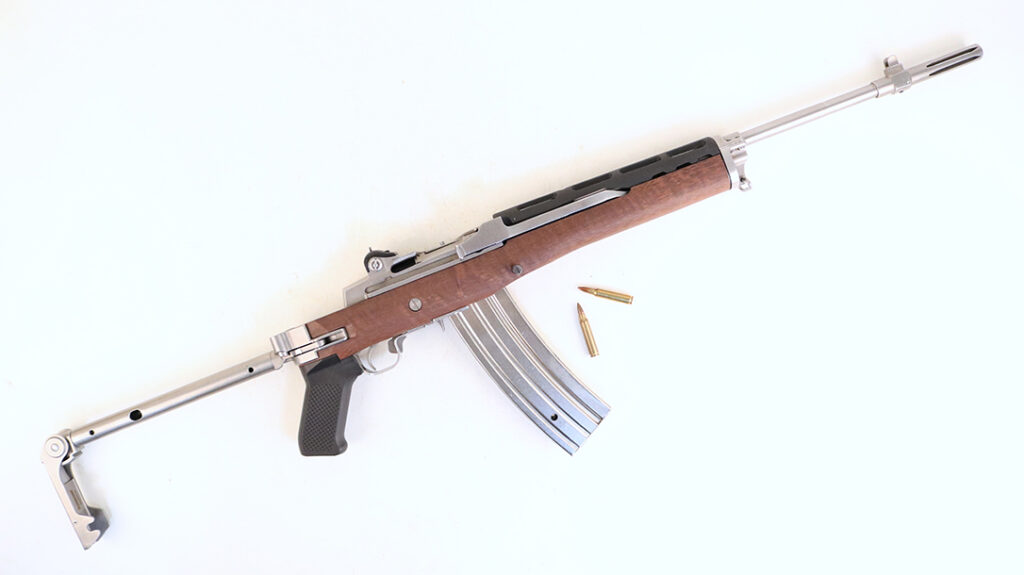
The basic chassis was a standard stainless steel Ruger Mini-14 rifle. Designed by L. James Sullivan and Bill Ruger, the Mini-14 was, esoterically at least, a miniaturized semiautomatic version of the GI M-14 service rifle. Sullivan was part of the brain trust that brought us the AR-15. Unlike the M-14, the Mini-14 was built around an investment cast steel receiver and fired .223 Remington ammunition.
Ruger offered the Mini-14 in both semi-auto civilian versions as well as selective-fire variants for military and Law Enforcement. Finishes were either blued or stainless steel. The full-auto version was the AC-556.
The Mini-14 sold well in a world not yet inured to scary black rifles. That seems positively quaint in retrospect. The A-Team guys, however, were still looking for a little extra jazz.
Tactical Details
The show’s armorers started out with the basic stainless steel, folding stock Mini-14 before adding a matching stainless flash suppressor and either a 30- or 40-round magazine. Some of the guns sported pierced stainless handguards, while others retained the black polymer originals. These iconic Mini-14’s did not make their appearance until Season 2, but they served ably and well until the end of the show. The weapons were purchased specifically for the production and stored in the prop trailers, traveling to the shooting locations with the rest of the gear. As the weapons were all semi-auto; there were no superfluous legal considerations.
The weapons appear to be full-auto in the show. The actors simply stroked the triggers as quickly as possible, and the Foley editors dubbed in full-auto gunfire sounds in post-production. Sequential squibs on the receiving end completed the charade.
Considering they were supposed to be highly-trained Special Forces operators, the four members of the A-Team exhibited truly deplorable marksmanship. Despite expending hundreds of rounds, the bad guys always rolled out of the way or crawled out of their wrecked cars dazed but unhurt. This was, after all, a family show.
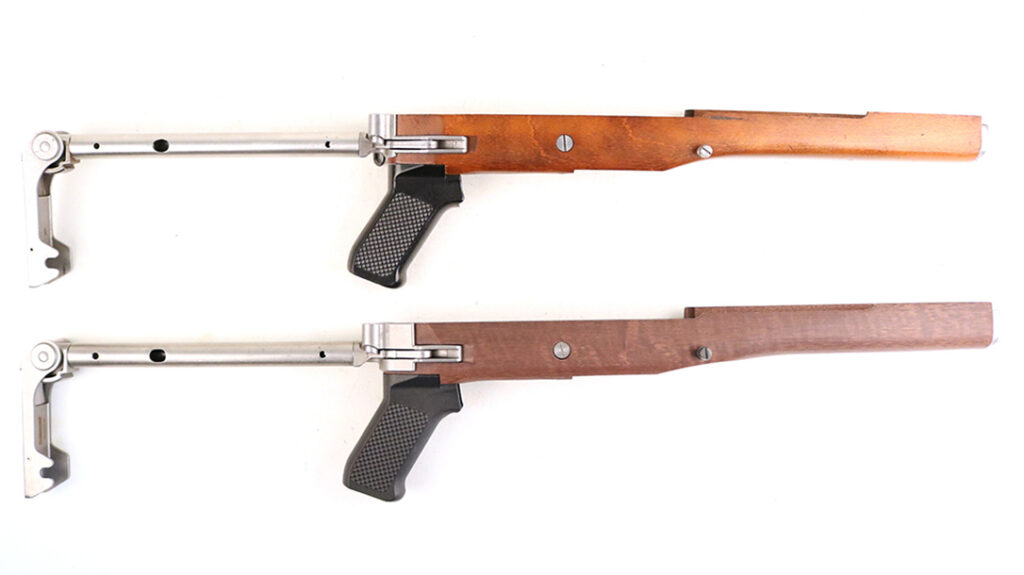
Where Do I Get One?
Mini-14 rifles remain in production today. However, in the early aughts, Ruger revamped the design to include a heavier barrel and fenced front sight. For the purist, that just won’t do. 1980’s-vintage stainless Mini-14’s are expensive on GunBroker. However, I was fortunate to buy one once owned by an idiot.
Some rocket surgeon drilled and tapped this otherwise-pristine stainless Mini-14 for an aftermarket scope mount. I was thrilled. I filled the holes with stubby little Allen screws and saved about $400.
The flash suppressor comes from Choate Machine and Tool. To mount it up you simply punch out the pin that retains the factory front blade and tap it off. Then slip the new flash suppressor in place and secure it with the included setscrew and a spot of Loc-Tite. The real challenge was always the folding stocks.
Samson Manufacturing used the original tooling to create a spot-on rendition of the classic factory side-folder. Ruger actually uses Samson stocks on factory rifles today. They are essentially indistinguishable from the originals at a fraction of the cost. Once folded, the pivoting buttplate locks in place via a stud on the side of the stock. The end result is a bit blocky but eminently functional and just cool as can be.
Extended stainless magazines can be tough to find. I landed mine on GunBroker. Be patient and stalk your prey, and they need not be just crazy expensive.
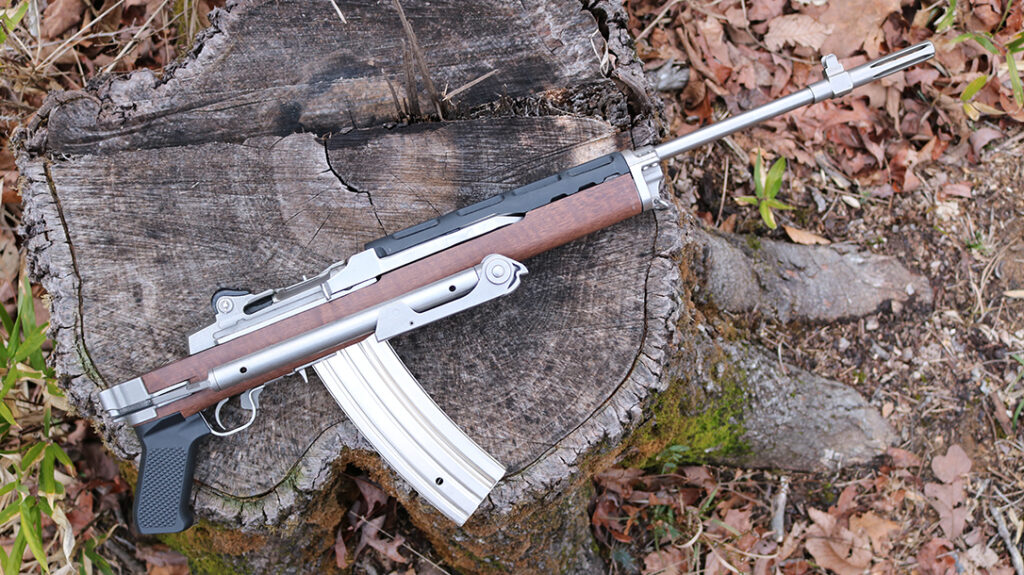
Ruminations
The end result shoots like any other vintage Mini-14, which is not terribly great. Magazines must be rocked in and out like those of a Kalashnikov, but this aids in seating with the bolt closed. Most any rack-grade AR-15 is cheaper, shoots straighter, and remains more comfortable. However, that’s not really what we are after here, now is it?
Now I can don my leather jacket, run my fingers through my prematurely grey hair, slip a cheap cigar between my teeth, and take up my DIY A-Team Mini-14 just like Hannibal Smith. For the briefest moment I am transported back to the TV that defined my childhood. I do love it when a plan comes together.
For more info, visit ruger.com and samson-mfg.com.
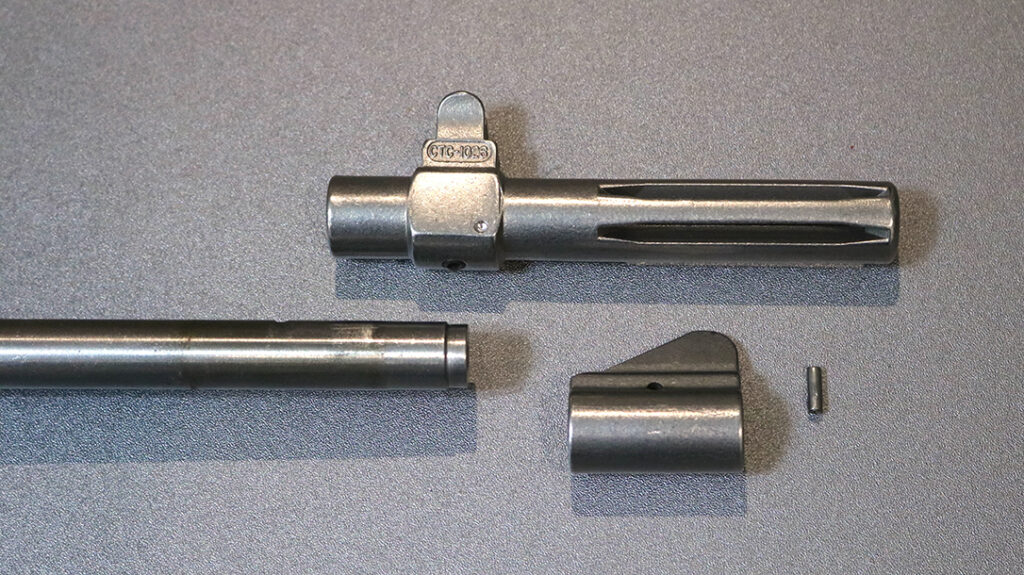
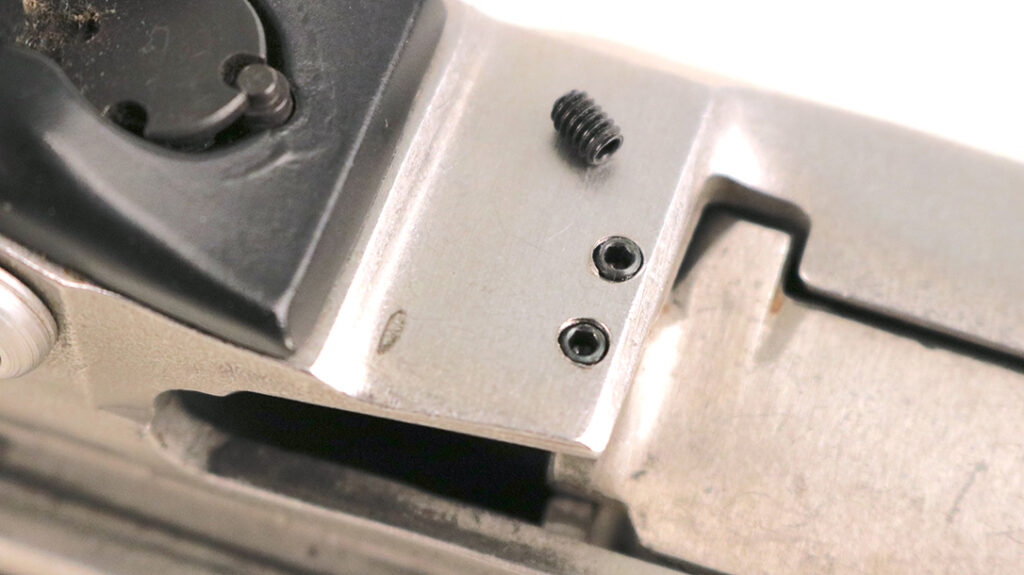
Ruger Mini-14 Tactical With Side-Folding Stock
Don’t want to build your own? Well, Ruger has you covered with it’s recently-released Ruger Mini-14 Tactical, with an MSRP of $1,849. This one emulates the ’70s and ’80s builds, looking like it was ripped right out of the hands of Hannibal himself. – Eds.
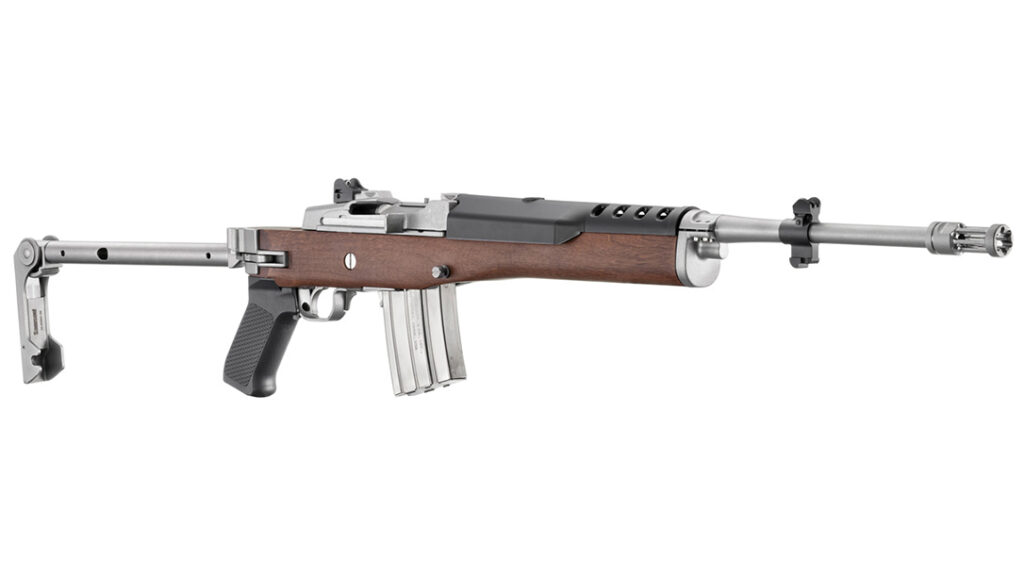






Didn’t find what you were looking for?
Read the full article here




